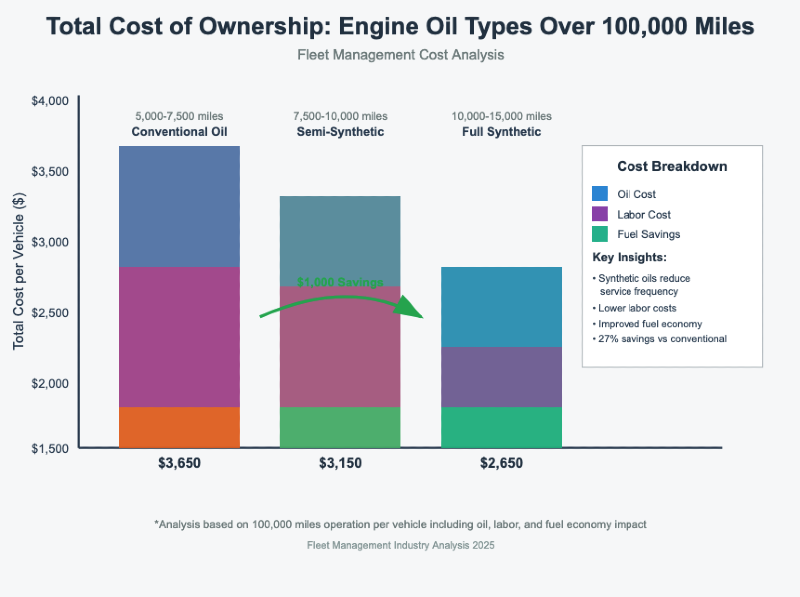Managing a business fleet effectively requires careful attention to every operational detail, and engine oil selection stands as one of the most critical yet often overlooked cost factors. For companies operating mixed fleets of premium vehicles from manufacturers like Mercedes, BMW, Audi, and Volkswagen, the choice of engine oil directly impacts maintenance schedules, fuel consumption, and overall operating expenses.

The Hidden Economics of Engine Oil Selection
Fleet managers frequently focus on obvious costs like fuel prices and insurance premiums while underestimating the financial impact of oil selection. However, research indicates that strategic oil choices can reduce total fleet operating costs by 8-12% annually through extended service intervals, improved fuel economy, and reduced engine wear.
Modern synthetic oils offer superior protection compared to conventional alternatives, allowing engines to operate efficiently for longer periods between changes. This translates into reduced downtime for maintenance, lower labor costs, and fewer service appointments across the entire fleet.
Understanding Oil Categories and Their Cost Implications
Conventional Engine Oils
Traditional mineral oils remain the most affordable option upfront but require more frequent changes, typically every 5,000-7,500 miles. While the initial purchase price appears attractive, the total cost of ownership increases due to frequent service requirements and associated labor costs.
Semi-Synthetic Blends
These products combine conventional and synthetic base oils, offering improved performance over standard oils while maintaining reasonable pricing. Semi-synthetic oils typically extend service intervals to 7,500-10,000 miles, making them suitable for moderate-duty fleet applications.
Full Synthetic Options
Premium synthetic oils command higher purchase prices but deliver exceptional value through extended drain intervals, often reaching 10,000-15,000 miles between changes. The superior thermal stability and viscosity retention of synthetic oils also contribute to improved fuel economy and reduced engine wear.
Fleet Maintenance Interval Optimization
Extended oil change intervals represent one of the most significant opportunities for cost reduction in fleet management. VW engine oil should be changed according to the manufacturer’s recommended service intervals, typically every 10,000 to 15,000 miles for most modern Volkswagen models. Similar intervals apply to other premium European manufacturers when using approved synthetic oils.
By standardizing on high-quality synthetic oils across the fleet, managers can align maintenance schedules, reduce the frequency of service appointments, and minimize vehicle downtime. This approach proves particularly beneficial for companies with geographically dispersed operations, where coordinating maintenance becomes increasingly complex.
Fuel Economy Benefits Through Oil Selection
Engine oil viscosity directly affects internal friction and, consequently, fuel consumption. Lower viscosity oils, such as 0W-20 or 5W-30 grades, reduce internal engine resistance and can improve fuel economy by 1-3%. Over thousands of miles and multiple vehicles, these seemingly small improvements generate substantial savings.
Modern synthetic oils maintain their viscosity properties more consistently across temperature ranges, ensuring optimal protection during cold starts while providing efficient lubrication at operating temperatures. This consistency translates into more predictable fuel consumption patterns across the fleet.
Major Oil Brand Analysis and Performance
The engine oil market offers numerous options from established manufacturers, each with distinct characteristics and pricing structures. Castrol leads the premium segment with its advanced synthetic formulations, particularly the GTX and EDGE series, which deliver exceptional protection for high-performance engines commonly found in luxury fleet vehicles. Mobil 1 synthetic oils have earned widespread recognition for their thermal stability and extended drain capabilities, making them ideal for demanding fleet applications.
Ridex offers cost-effective solutions that meet OEM specifications while providing competitive pricing for budget-conscious fleet managers. Shell Helix and Total Quartz products occupy the mid-range market, balancing performance with affordability. Liqui Moly, particularly popular with European vehicle manufacturers, provides specialized formulations that meet strict ACEA and API standards required by Mercedes, BMW, and Audi vehicles.
Implementation Strategy for Fleet Managers
Successful oil optimization requires a systematic approach that considers vehicle specifications, operating conditions, and maintenance capabilities. Begin by auditing current oil usage across the fleet, identifying vehicles using different oil types and change intervals.
Consolidate oil specifications where possible, selecting products that meet multiple manufacturer requirements. This standardization simplifies procurement, reduces inventory costs, and minimizes the risk of using incorrect oil types.
Establish partnerships with oil suppliers and service providers who understand fleet requirements and can offer volume discounts. Many suppliers provide technical support and oil analysis services that help optimize change intervals based on actual operating conditions rather than generic recommendations.
Measuring and Monitoring Cost Savings
Implement tracking systems to monitor the financial impact of oil optimization initiatives. Key metrics include total oil costs per mile, maintenance frequency, fuel consumption changes, and unexpected repair costs related to engine wear.
Regular oil analysis programs can provide valuable insights into engine condition and optimal change intervals. These laboratory tests identify contamination levels, additive depletion, and wear metals, allowing for data-driven decisions about service timing.
Long-term Fleet Health Considerations
While immediate cost savings often drive oil selection decisions, long-term engine health significantly impacts fleet economics. Premium oils reduce wear rates, extend engine life, and maintain performance characteristics longer than conventional alternatives.
Engines operating on high-quality synthetic oils typically require fewer major repairs and maintain better resale values when vehicles reach replacement age. These factors contribute to lower total cost of ownership and improved fleet ROI.
Future Trends and Considerations
The automotive industry continues evolving toward more efficient engines with tighter tolerances and extended service intervals. These developments favor high-performance synthetic oils that can meet increasingly demanding specifications.
Electric vehicle adoption will eventually reduce oil consumption, but hybrid systems still require premium lubricants to protect complex powertrains. Fleet managers should consider these trends when developing long-term oil procurement strategies.
Strategic engine oil selection represents a proven method for reducing fleet operating costs while maintaining vehicle reliability and performance. By focusing on total cost of ownership rather than upfront prices, fleet managers can achieve significant savings while ensuring optimal vehicle protection across their entire operation.
Primary Industry Sources
1. Society of Automotive Engineers (SAE International)
• SAE J300 Engine Oil Viscosity Classification
• SAE Technical Papers on Fleet Maintenance Optimization
• Annual Fleet Management Best Practices Report 2024
2. American Petroleum Institute (API)
• API Engine Oil Licensing and Certification System
• Fleet Lubrication Guidelines and Standards
• Motor Oil Performance Standards Documentation
3. Fleet Management Industry Reports
• Fleet Management Association Annual Survey 2024
• Commercial Fleet Maintenance Cost Analysis Report
• Automotive Fleet Magazine Industry Benchmark Studies
Manufacturer Technical Documentation
4. Original Equipment Manufacturer (OEM) Specifications
• Mercedes-Benz Fleet Service Guidelines
• BMW Commercial Vehicle Maintenance Standards
• Audi Business Fleet Technical Bulletins
• Volkswagen Commercial Service Intervals Documentation
5. Oil Manufacturer Technical Data
• Castrol Commercial Fleet Technical Bulletins
• Mobil 1 Fleet Performance Studies
• Shell Helix Commercial Application Guidelines
• Total Quartz Fleet Optimization Research
Fleet Operations Research
6. Fleet Cost Analysis Studies
• National Association of Fleet Administrators (NAFA) Cost Reports
• Fleet Financial Management Research Institute
• Commercial Vehicle Operating Cost Studies 2023-2024
7. Maintenance Interval Optimization Research
• Automotive Maintenance and Repair Association (AMRA) Studies
• Fleet Equipment Institute Technical Papers
• Commercial Vehicle Maintenance Benchmarking Reports
Fuel Economy and Environmental Impact Data
8. U.S. Department of Energy
• Federal Fleet Requirements for Energy Efficiency
• Alternative Fuel and Advanced Vehicle Technology Studies
• Commercial Vehicle Fuel Economy Improvement Research
9. European Automobile Manufacturers Association (ACEA)
• European Oil Sequences for Commercial Vehicles
• Fleet Emissions and Efficiency Standards
• Commercial Vehicle Lubrication Guidelines
Cost-Benefit Analysis Sources
10. Fleet Financial Analysis
• Commercial Fleet Total Cost of Ownership Studies
• Fleet Leasing and Management Cost Comparisons
• Business Vehicle Operating Expense Research
11. Industry Benchmark Data
• Fleet Maintenance Cost Per Mile Studies
• Commercial Vehicle Lifecycle Cost Analysis
• Fleet ROI Optimization Research Reports
Technical Standards and Specifications
12. International Standards Organization (ISO)
• ISO 4925 Road Vehicles – Specification for Petroleum-based Engine Oils
• ISO Technical Committee 22 Road Vehicle Standards
13. ASTM International
• ASTM D4485 Standard Performance Specification for Automotive Engine Oils
• ASTM Commercial Vehicle Lubrication Standards


